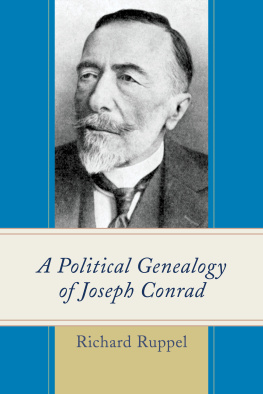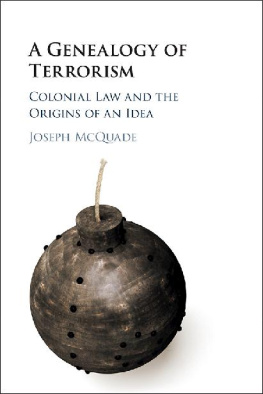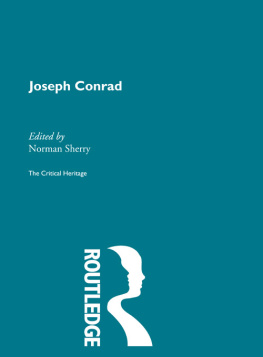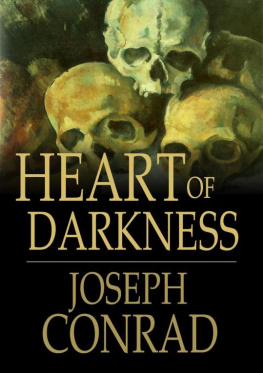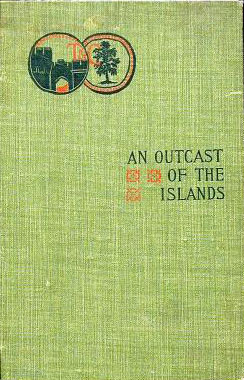Ruppel - A Political Genealogy of Joseph Conrad
Here you can read online Ruppel - A Political Genealogy of Joseph Conrad full text of the book (entire story) in english for free. Download pdf and epub, get meaning, cover and reviews about this ebook. City: LANHAM, year: 2016;2012, publisher: Lexington Books, genre: Romance novel. Description of the work, (preface) as well as reviews are available. Best literature library LitArk.com created for fans of good reading and offers a wide selection of genres:
Romance novel
Science fiction
Adventure
Detective
Science
History
Home and family
Prose
Art
Politics
Computer
Non-fiction
Religion
Business
Children
Humor
Choose a favorite category and find really read worthwhile books. Enjoy immersion in the world of imagination, feel the emotions of the characters or learn something new for yourself, make an fascinating discovery.
- Book:A Political Genealogy of Joseph Conrad
- Author:
- Publisher:Lexington Books
- Genre:
- Year:2016;2012
- City:LANHAM
- Rating:5 / 5
- Favourites:Add to favourites
- Your mark:
- 100
- 1
- 2
- 3
- 4
- 5
A Political Genealogy of Joseph Conrad: summary, description and annotation
We offer to read an annotation, description, summary or preface (depends on what the author of the book "A Political Genealogy of Joseph Conrad" wrote himself). If you haven't found the necessary information about the book — write in the comments, we will try to find it.
Ruppel: author's other books
Who wrote A Political Genealogy of Joseph Conrad? Find out the surname, the name of the author of the book and a list of all author's works by series.
A Political Genealogy of Joseph Conrad — read online for free the complete book (whole text) full work
Below is the text of the book, divided by pages. System saving the place of the last page read, allows you to conveniently read the book "A Political Genealogy of Joseph Conrad" online for free, without having to search again every time where you left off. Put a bookmark, and you can go to the page where you finished reading at any time.
Font size:
Interval:
Bookmark:
A Political Genealogy of Joseph Conrad
A Political Genealogy of Joseph Conrad
Richard Ruppel
LEXINGTON BOOKS
Lanham Boulder New York London
Published by Lexington Books
An imprint of The Rowman & Littlefield Publishing Group, Inc.
4501 Forbes Boulevard, Suite 200, Lanham, Maryland 20706
www.rowman.com
16 Carlisle Street, London W1D 3BT, United Kingdom
Copyright 2015 by Lexington Books
All rights reserved. No part of this book may be reproduced in any form or by any electronic or mechanical means, including information storage and retrieval systems, without written permission from the publisher, except by a reviewer who may quote passages in a review.
British Library Cataloguing in Publication Information Available
Library of Congress Cataloging-in-Publication Data
Ruppel, Richard J. (Richard Jeffrey), 1954
A political genealogy of Joseph Conrad / Richard Ruppel
pages cm
Includes bibliographical references and index.
ISBN 978-0-7391-7824-9 (cloth : alk. paper)ISBN 978-0-7391-7825-6 (electronic)
1. Conrad, Joseph, 1857-1924Political and social views. 2. Conrad, Joseph, 1857-1924Criticism and interpretation. 3. Politics and literatureGreat BritainHistory20th century. 4. Political fiction, Englis-History and criticism. 5. Politics in literature. I. Title.
PR6005.O4Z7914 2014
823'.912dc23
2014033111
 TM The paper used in this publication meets the minimum requirements of American National Standard for Information Sciences Permanence of Paper for Printed Library Materials, ANSI/NISO Z39.48-1992.
TM The paper used in this publication meets the minimum requirements of American National Standard for Information Sciences Permanence of Paper for Printed Library Materials, ANSI/NISO Z39.48-1992.
Printed in the United States of America
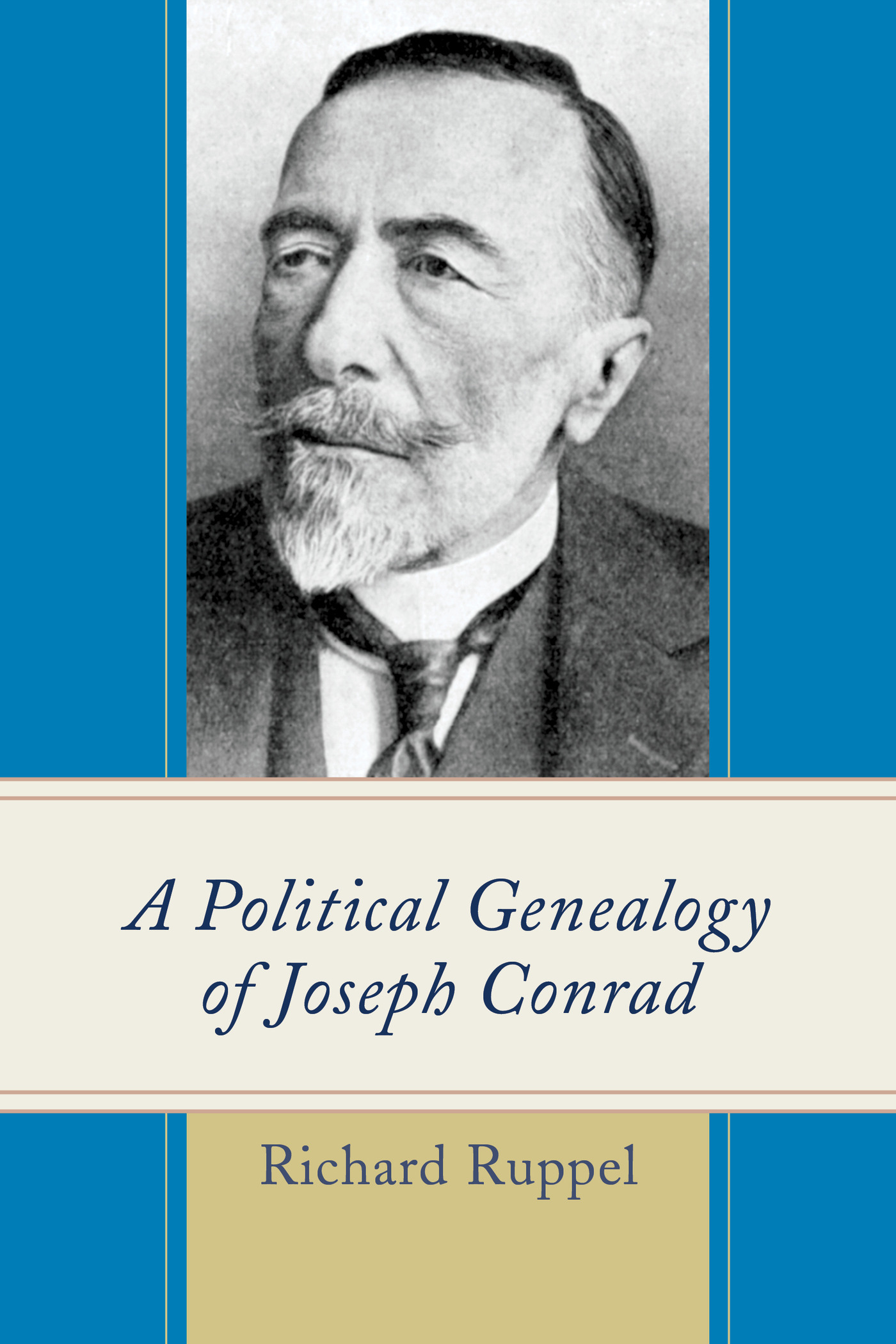
Parts of chapter 2, on Lord Jim, first appeared in Studies in the Novel in 1998, and parts of chapters 3 and 5 first appeared in Conradiana, in 1989 and 2009. Thanks to the Johns Hopkins University Press and Texas Tech Press for allowing me to reprint modified versions of these essays here.
Many friends and colleagues in the Conrad community heard and commented on early versions of some of these ideas when I presented them at conferences. I am grateful for their responses, especially their disagreements, which helped me refine my positions. I am also grateful to my good friend and colleague, the Dean of Wilkinson College at Chapman University, Patrick Fuery, who provided funding for my attendance at those conferences as well as release time to work on the book.
Finally, thanks to Kathy, Sarah, Liz, Benjamin, Jason, Tiago, and Sebastian. This is for themwith love.
Conrads Radically Contingent Politics
Jzef Teodor Konrad Korzeniowski, who gradually transformed himself into the English writer, Joseph Conrad, was a mercurial personality. He left Poland for the sea, though he had no experience with salt water and no family history in sailing. He left the Polish language for French, and then for English. He attempted suicide at the age of twenty. He invested in various schemes and lost his inheritance. He married an English typist nearly sixteen years younger than himself with whom he had nothing in common. He worked as a writer though he made no money through all the years of his most important work and though he experienced psychological breakdowns of varying intensity after completing each novel. He was warm with his friends, ingratiating with influential strangers, but also intensely irritable and easily offended.
His work is as varied and changeable as his personality, from his first two, emotionally intense Malay novels, to the stolid and confident Nigger of the Narcissus and Typhoon; from the coldly ironic Outpost of Progress to the nightmarishly subjective Heart of Darkness; from the leisurely, panoramic visions of Nostromo to the tautly nervous, claustrophobic ironies in The Secret Agent.
Despite the fact that Conrad was changeable and subject to extreme mood swings, and despite the extraordinary thematic and tonal range of his work, critics have attempted to impose a stable political perspective on his fictionmost often an Edmund Burkean, organic conservatism, influenced by his Polish background. This is understandable; until recently, a literary critics primary role has been to impose order on an authors creative work or to identify groups of authors as part of well-defined movements. So, in his Politics and the Novel (first published in 1957), Irving Howe persuasively established a conservative base from which to view and understand Conrads politics, identifying him, essentially, as a little Englander:
Conrads conservatism, which is at least as much a psychological reflex as a formulated opinion, reached its full bloom in England. It is not an aggressive conservatism, Conrad being, for one thing, anti-imperialist in an age of imperialism; his rather querulous political mood came closest to Little Englanders, those who wished to freeze history at the point where England had been a prosperous mercantile nation but not yet a world power, and where the English gentleman and his country house had seemed indestructible monuments to an eternal order of virtue. This is a politics of defense: a desire to remain untouched by the fearful effects of industrialism, to be let alone by history, to retain privileges and values that are slipping away. (79)
Conrads conservatism, Howe adds, his hatred of the anarchists, his suppressed residue of nationalism must now seem more equivocal than at first sight. The anarchism he attacks is... a projection of an unrevealed self, of the desolation a modern ego fears to find beneath its domesticated surface (82). In other words, Conrad fears anarchism for psychological reasons. He fears his own disorder.
Howe claims that Conrad was profoundly conservative, even reactionary, in his politics. Thus, he hated revolutionaries, and this damaged the way he presented them in his work. His hatred was a consequence of his traumatic childhood. His fathers revolutionary activity, Howe argues, left him an orphan and a life in permanent exile, and Conrads political positions can all be traced back to this. According to Howe, when Conrad expresses any sympathy for revolutionary thought and behavior it is because he despairs that any system will alleviate every thinking persons profound alienation and loneliness. The only answer is annihilation, the remedy suggested (and essentially left unchallenged) in The Secret Agent.
This has proven to be a persuasive analysis, but Howe is rather nave in the way he deals with Conrads psychology; we are asked to imagine that Conrads personality, politics, and art derived almost entirely from childhood trauma. This leads Howe to undervalue and, essentially, to misread Conrads most finished novel, The Secret Agent. In their preoccupation with Conrads psychology, later critics followed Howes lead in their efforts to impose a consistent political perspective on Conrads work.
In the first full-length analysis devoted to Conrads politics, The Political Novels of Joseph Conrad (1963), Eloise Knapp Hay refers to the claim that Conrad wrote out of his sense of guilt for having left Poland, a position Hay herself supports in her discussion of Lord Jim. Hay notes Conrads preference for death to surrender and his defense of fanaticism as arising from his Polish heritage. Hay claims that Conrads attraction to lost causes was not because he supported archaic monarchies but because they
Next pageFont size:
Interval:
Bookmark:
Similar books «A Political Genealogy of Joseph Conrad»
Look at similar books to A Political Genealogy of Joseph Conrad. We have selected literature similar in name and meaning in the hope of providing readers with more options to find new, interesting, not yet read works.
Discussion, reviews of the book A Political Genealogy of Joseph Conrad and just readers' own opinions. Leave your comments, write what you think about the work, its meaning or the main characters. Specify what exactly you liked and what you didn't like, and why you think so.

